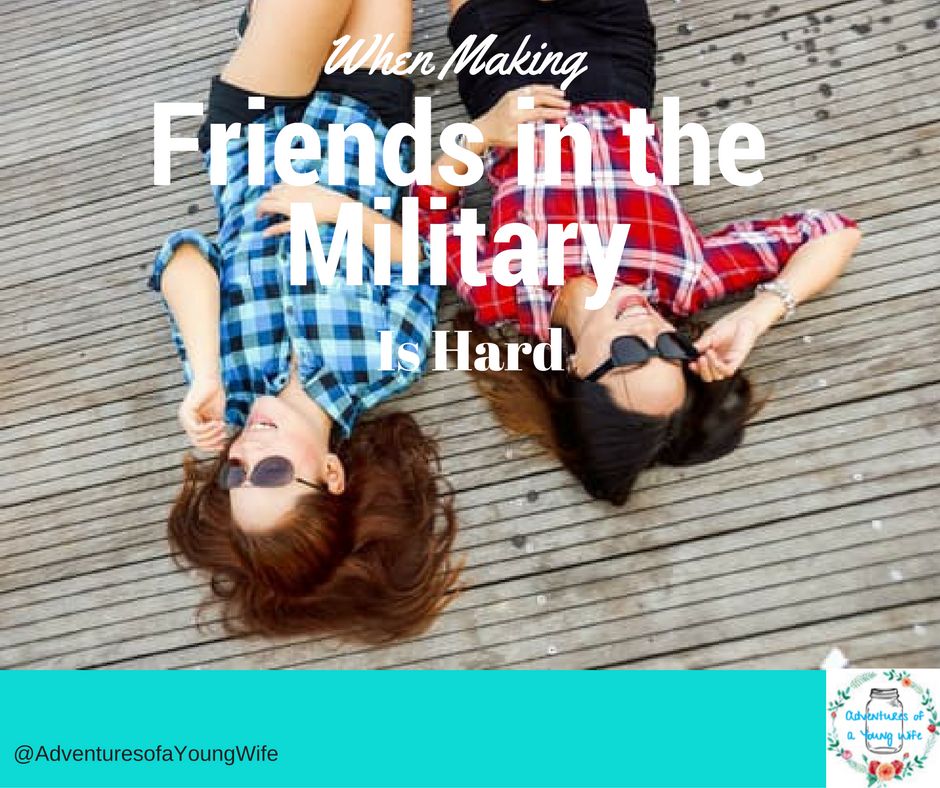 So far we have covered, marriage, mental wellness, and now onto friendships. As a marital relationship, friendships also contribute to over all wellbeing. Friendships increase a sense of belonging and purpose, boosts happiness, reduces stress, can help you cope with traumas, and encourage you. However, we do need to be careful about the friends we choose. Toxic friendships can influence us in negative ways, dragging us down, increasing stress, and discouragng you from positive behaviors, and encouraging negative behaviors. As you see friends are important, but its more so the quality of friends you have that make your life better. My husband just hit his year active duty mark in the military, just two weeks after our one year wedding anniversary. I knew moving around was part of the life-style before we got into it. And I felt like I was prepared because I had moved around a bit as a child; however, I was not prepared for how quickly I would make meaningful and lasting friendships with some wonderful ladies (I guess having to rely on them when your husbands are never home for months does that to you!) and how quickly I would have to say goodbye. I have been here for 6 months and I have already made life-long friendships and I have already had to say good bye to many friends! How could 6 months bring so much change? I saw on my Facebook page this morning a video for my “2016 in Review” and in that it showed me how many friends I had added this year, 76. That is crazy to me! Basically that means 76 new ‘friends’ (I don’t hang out with most of those, but still that’s a lot of new connections in just 6 months). So it kind of seems like friendships are hard to come, easy go; which is extremely difficult if you are not already an outgoing person, eager to constantly be putting yourself out there, making new friends. For some people this is really discouraging. How do you cope with the constant flux of friendships that we experience as military spouses? It can be difficult to deal with, especially as a new spouse, I had no idea how quickly this would hit me. I was not prepared for having made friends and them leave so quickly. Here are some simple ways I have found to cope with transitions:
Finding Community When the friends we initially make begin to move away, it is hard to find motivation to go out and cultivate new friendships. In my work as a counselor with military families I have heard many women say, “what’s the point of making friends here, we are just going to be gone in a few months anyway.” And I have felt that a few times myself. I am especially feeling that now with many of my friends having left or are about to leave. Furthermore, we are only looking at being here for a couple more months. But, I am here to tell you what the point is! The reason you make friends even if you are only going to be around a short time is that friendships help combat loneliness. And prolonged loneliness leads into depression. Now not everyone who is lonely will wind up depressed, but it certainly doesn’t help! We can’t get trapped into fearing putting ourselves out there and refuse to make new friends. As hard and uncomfortable as it is we need to continue to grow friendships regardless of how much time we have left at a duty station. Friendships breed community. We as humans were not designed to live in isolation; we were meant to live as a community. That is why people thrive when they are plugged into their surroundings. We cannot be our best self in isolation, we will not feel good about ourselves. Self-esteem and sense of self-worth both take a hit when we try to function in prolonged isolation. Community is important no matter if you are a military family or not, but it is my experience that military families are more heavily reliant on outside communities than civilians are because they are more likely to be far from any kind of family support. When you don’t have any family around there is no one else to rely on in times of trouble other than the community that you have built up around you. Just recently I read a Facebook post written by a spouse here at Fort Benning. She was pregnant and sick, her husband was working and unable to get home immediately, she couldn’t drive herself to the ER and had no one to watch her kids all because she had not built up a community around her. Now she is totally dependent on her husband who can’t be there for her right now. This is the kind of situation that results when you rely on far away family and friends to be your emotional support and social interactions, there is no community surrounding you when you need someone. Just as phone and video interactions with far away family members can’t be the entirety of your social interactions, neither can your husband. Your husband cannot be your sole source of social interactions and validation. You will soon wear him out because he is not meant to be your sole emotional support; primary yes, but only, not so much. If we are not the best versions of ourselves, we cannot provide the support and validation that our husbands and children need. This creates a vicious cycle of neglect of emotional wellbeing. Now I am not saying that having friends will fill the void that might be left by relying solely on your husband, only God can do that when we lean on him. But a husband cannot be your community as much as you try to make him so. It will only leave you feeling isolated. Your Challenge - Putting Yourself out there I know it’s hard ladies, it takes me out of my comfort zone, just as much as yall. It can seem unfair when some really extraverted, outgoing people always seem to have friends and all the resources in the area! And you are sitting there all alone just hoping for a semblance of friendship. Now I am not saying you have to be friends with everybody. But we do have to leave our little nest of blankets and pillows on our couches (and turn off the Netflix, it will still be there when we get home) be vulnerable and open ourselves to the idea of making friends and finding community. We have to leave our comfort zone every once in a while or we will begin to feel isolated, lonely, and depressed. So maybe one day you respond and accept someone’s invitation to go to Starbucks or attend an event you normally wouldn’t. Take a chance, maybe that should be your New Year’s Resolution. You’ll probably be surprised how having a community around you will make you feel more secure. How are you prepared to make friends this year? And don't forget to check out Week 1, Week 2, and Week 3 here!
8 Comments
So who is ready for part 2 of the Wellness Challenge! This week I wanted to focus on mental health and take it a step further into mental wellness. As a trained marriage and family counselor, this is my area of expertise, helping people learn how to cope with their circumstances in ways which will help them overcome and grow rather than avoid or be manipulated by their circumstances. While mental illness is definitely a big deal (it is a subject for another time because it is so important it deserves its own space), we don't want to just avoid mental illness, we also want to thrive, and that is mental wellness. This is a preventative measure against developing mental illness. For those struggling with anxiety and depression, many of these unhealthy coping mechanisms may look familiar to you, but it is definitely possible to incorporate the healthy coping mechanisms I listed below as well! So that is why my week two goal is to continue to incorporate these Healthy coping strategies into my everyday life. And you should too, because mental wellness is affected and effects every part of your life. As we saw last week, it affects your relationships, especially your marriage; it affects work; it affects parenting; it even affects your physical health.
I recently read a blog post, 15 Unhealthy Coping Skills, written by Jackie over at Laughter & Loving Life. And it got me thinking there are so many unhealthy coping skills that we all engage in on a daily basis. I have seen so many unhealthy coping skills in my experience as a family counselor, used by both children and adults. But what I have noticed is that no matter what strategy they used, the point to these unhealthy coping skills was to avoid the problem and having to deal with it. Here are the 15 unhealthy coping skills Jackie came up with:
If we always use unhealthy coping mechanisms, we will never feel as though we have overcome the situation that is causing the stress in the first place. In fact, it will probably cause more issues and we will continue the cycle of unhealthy coping by avoiding those extra issues by using the same unhealthy patterns. It may temporarily make us feel better, but in the long run we have solved nothing, but avoiding a problem. And until the problem is solved, we will continue to be plagued by the circumstances we are actively avoiding. That is not a way to live well; which is something we should all be striving for! So from a family counselor here are 15 Healthy counter coping strategies to try out instead of the ones above. I have compiled this list from talking to clients about what works for them in difficult situations and other suggestions that other counselors often give their own clients, as well as things that have worked for me in the past.
So there you have it, 15 healthy coping mechanisms that I would recommend to any of my clients. Not all coping skills will work for everyone in all situations, but I am sure there is at least one or two that can be used in any situation by any person. With the New Year just starting, here is my challenge to you, try to replace one of your unhealthy coping skills with one of the healthy choices from the 2nd list. Try it out and see if it helps! Let me know if it does or doesn’t and why it did or didn’t work for you! But it is my suspicion that while it may be more uncomfortable in the moment, it will help you solve the issue more quickly which will remove an even bigger discomfort! So choose emotional health this New Year! And don't just settle for the absence of mental illness or lessened severity of mental illness, strive for mental health and above that mental wellness, and just maybe you'll find yourself growing in the year 20171 So your challenge this week: pick 2 to 3 unhealthy coping mechanisms and try to replace them with 1 or 2 Healthy Coping Mechanisms. Try it for a week and see if it makes a difference for you! What are your go to coping mechanisms? Check out Week 1 and Week 3 here! So who is ready for the first part of the wellness challenge! I thought the first place to start was with one of our most important relationships (after our relationship with God), our marriage! The health of our marriages is extremely important! People in healthy marriages live longer (250% longer for married men and 50% longer for married women), promotes mental wellness and protects against mental illness (are less anxious and depressed), it lowers your chance of being a victim of violence both for men and women, there are financial benefits as earning potential increases for maried couples, and a better sex life (which can boost immunity, reduce stress, ease tension and headaces and all sorts of other physical benefits, as well as increasing intimacy with our spouse), leading to great self-esteem, self-worth, and feeling desired and wanted.
When our marriages are happy and healthy, we are more happy and healthy individuals and when we are more happy and healthy individuals we have happy and healthy marriages (we don't really know what comes first, its like the chicken and the egg - but regardless they occur together). Marital health and satisfaction is directly related to our overall wellbeing, which in turn will make our marriages better! But, a good marriage doesn't come without work. We need to put effort into our marriage, pray with and for our spouse, listen to them, talk to them, respect them, and cherish them. Sometimes we let our marriage fall to the way side because we become so comfortable with our partner that we stop striving to make our marriages better, but this is just harming your wellness and your spouses! So now we know why it is important to our overall wellness to have a happy marriage, here comes the challenge! Do you have goals for your marriage for 2017? I recently got a new planner and I am so excited! One of my favorite things about a new year is getting a new planer, looking at all the vast possibilities. This year my planner has an area exclusively dedicated to goals. What your goals for the year in several different categories: financial, personal, social, and business. It then breaks it down quarterly so you can break down your overall goals into manageable chunks. And as I was preparing my planner for the year I started to think about what I want my goals for 2017 to be! I want to grow my blog, develop professionally, learn how to save some money, and nurture my relationships. Those would be my big overall goals, and then break them down into manageable chunks. New Year Resolutions v. Goals Now I know everyone makes a New Year’s Resolution, but those are often broken before mid-January. Goals are more impactful, and longer lasting than a New Year’s Resolution, especially if you put it in writing. As we enter January and prepare ourselves for the coming year focusing on wellness and how we are going to live well this year remember all facets of life are important. As you can see in the categories above my planner didn’t have a space for any marital, or relational goals. I know that not everyone purchasing the planner would be married or in a relationship, but I think this area of our lives often gets overlooked when we make goals, especially if things are already going well. We don’t really try to improve unless the relationship is on the brink of dissolution. Goals often focus on health, financial success, work, or academics. But those of us who are married or in committed relationships need to make goals concerning where we want our relationship to end up. That is why I am making goals for my marriage this year! As I am just entering my second year of marriage I want it to be even better than the first. And after all, I ask my clients to make goals for their relationship all the time in counseling so we know what we are working towards. Why would I recommend to my clients to make goals concerning their relationship if I do not do so in my relationship. I ask them to make goals because it is an effective method of charting where you want to end up and the progress you are making to get there. In counseling this is particularly effective because there is someone to hold you accountable to working towards your goal. So here are my marriage goals for 2017:
A Challenge to All I encourage each of you to make goals for your marriage this year, write them down, and post them somewhere in your house where they can be seen on a regular basis. When making your own goals, keep it to three to minimum and five at a maximum. A manageable number will ensure that you will not get overwhelmed and forgo your goals. Make them measurable. For example, one of my goals was “to attend church at least twice a month, if not more” not just “attend church more.” This is specific and measureable. I will know if I have achieved this. Make sure your partner is on board, this helps if you sit down together to make the goals. This could be a fun date idea for ya’ll to start off the New Year. If they are joint goals they will be much easier to accomplish, you can hold each other accountable to achieve your goals. If you need further help staying accountable maybe you can partner up with another couple that you trust, share your goals with another couple and ask them to help you stay accountable, check in regularly; and you can do the same for them. What are some of your goals for your marriage this year? Let me know in the comments! Check out Week 2 and Week 3 here! As I started planning out my blogs for January I began noticing an unintentional theme as I prepare to kick off the New Year! So I have decided to make January the month of wellness as we prepare our relationships, mind and body for the next year and all the adventures that lay ahead! So join me on a wellness Challenge this month! I promise, you won't regret it!! So Next Tuesday the blog will feature the first wellness goals! What could be more important than our marriages ladies! So that is where I am going to start! I am excited to take this journey to wellness with you and I hope you join me in the challenge! See you next Tuesday! A week or so ago I wrote a post about why we need to stop husband bashing as a way of maintaining fondness and admiration for them. The is one of Gottman’s s Seven Principles for a Successful Marriage. When counseling couples, this is one of the main books and works that I draw on because his advice is well backed by science and research, and it works. I thought I would draw out one of his other principles for a successful marriage today: Solving solvable problems. Many of the problems we face in our relationship are things we simply cannot change. We cannot change our personalities, they are pretty well set; we can’t change extraneous circumstances, they are outside our control. We can’t change our extended family; we are pretty much just stuck with them. However, we can change how we relate to one another, and that can make all the difference when you and your spouse are trying to solve a problem. Remember, in a marriage you are a team, and you either win together or lose together; if one person ever walks away feeling like they lost, then both people lost. So practicing (and I choose this word specifically) practical conflict resolution skills can help you and your partner solve the solvable problems and overcome the non-solvable problems.
While Gottman’s unique approach to marriage counseling doesn’t focus solely on communication skills as more traditional models might. Rather he uses softening startups, making and receiving repair attempts, soothing yourself and your spouse, compromise, and tolerating each other’s faults. Now I am sure you are familiar with the last two or three components, but, the first two I think are the most important, so that is where I am going to focus. Softening Startups I am going to be the first to admit that I am not great at this; I tend to get very defensive, very quickly. However, I notice a radical difference in my husband’s response to me when I am soft and when I am defensive. Nothing can be resolved when one or both partners are in a defensive mode, this very quickly leads to arguments. We can’t avoid difficult conversations for fear of creating conflict either. Avoiding conflict will not bring us closer to our spouses, rather it will drive a wedge in between us making us feel ever more distant. That is why we need to use soft startups when we know we are broaching a difficult subject with our spouses. Softening means no accusations, “why didn’t you do…” “How come you can never do….” Instead say, “I would really appreciate if you could help me do… I really could use an extra set of hands on this project.” Often we feel underappreciated or a lack of help from our spouses simply because we haven’t asked for their help, and they can’t read our minds, it is not a sign of disrespect, more of ignorance. When we use I-statements and avoid blaming our spouses we are more likely to get the response we desire, they come and help us. Be polite, this is important, as we are more likely to oblige someone who is polite, rather than demanding. Making repair attempts Gottman has said it is not the number of fights a couple has that impacts relationship satisfaction, rather it is how well a couple can reconnect after the argument. This is the idea behind making and receiving repair attempts. Couples have to practice both, it is not enough for one person to continually make repair attempts if the other partner makes not effort to receive and accept them. A repair attempt can take many forms, but it is a way of turning toward your spouse (one of Gottman’s 7 Principles) after an argument. Repair attempts can be humorous jokes to break the tension after a fight, an apology, validating your partner’s emotions, and showing empathy. These can be done in the moment, during an argument. However, we are stubborn creatures, or at least I am! And often, we do not make repair attempts at the time because we feel justified in our position. Repair attempts can also be made later: apologize, tell your spouse you love him, and make sincere efforts to let them know you are sorry. And well we’ve all heard that making up is the best part of fighting… if you know what I mean! Not only do you need to make repair attempts, but you also need to be able to accept them when your spouse makes them! This requires being mature, and to stop dwelling on the argument and accept their apology. Give up your stubbornness, as hard as I know it is, believe me! If you want to know how well you are making and receiving repair attempts in your relationship, follow this link to The Gottman Institute Blog to go through the questionnaire and see how you rate. These tools can help make conflict within the marriage (which is inevitable, I don’t care how much you love each other, at some point there will be conflict). Remember, don’t avoid conflict in attempt to keep peace, unless you are looking to drive a wedge in between you and your spouse. If you soften your approach to complaints, it will lessen your partner’s defensiveness and you will be more likely to be able to solve your problems. Remember, not all conflicts can be solved, there will always be gender differences, personality clashes, family members that might not get along with our spouses that we can’t avoid. So try to come to compromises with those issues, and solve the ones you can so your relationship is not plagued with insolvable and solvable problems! I highly recommend reading Gottman’s Book, The 7 Principles to a Successful Marriage. It is full of questionnaires and assessments that can be used to monitor how you are behaving in your relationship. Anxiety runs rampant across the holiday season! And chasing right behind it is its close friend, Depression. But wait, isn’t Christmas supposed to be one of the most joyous and happiest times of the year? Then why do so many people find themselves weighed down, lethargic, and lacking the motivation to make it through the last stretch of the year? My theory, is that this is supposed to be a time to celebrate the birth of Christ, time with family and friends who enrich and fill our lives, and it turns into an anxious and exhausting time for some!
There is conflict over who we are supposed to go visit this year and who we visited last year; busted budgets; for some the stress of entertaining and making the house look spotless; making incredibly delicious and beautiful food; trying to guess what everyone wants for Christmas this year. You name it, someone out there is stressing out about it! And suddenly we are in a state of dread, panic and Anxiety moves in, and then we are so anxious we can’t imagine doing anything, we have no motivation. That is when Depression catches up to join us and Anxiety for this not so fun unwelcomed Christmas party we find ourselves in. Like two miserable unwanted house guests, we just can’t seem to get them to leave! As a counselor I am of the school of thought that thoughts are what drives everything in our emotional and behavioral repertoire. Thoughts give way to feelings which motivate certain behaviors. If we can find a way to change our thoughts about the upcoming hustle and bustle of the holiday and Christmas season we can change our feelings and the consequently our actions. We start by identifying the negative thoughts that are driving the anxious and depressed feelings. When we recognize the thought, we are one step closer to being able to change them. One way I suggest to do this is to create a thought log like this one. This can help you become aware of your negative thoughts, and what events trigger them. For example, maybe your negative thought is, “I can’t enjoy the season because I just can’t do something for one more event.” This thought might come right after your fourth child comes home with a note in her backpack asking parents for donation for the classroom Christmas party. Now that you know the thought and recognize it as it comes across your mind, when baby number five needs something you can prepare yourself and instead of let the thought consume you and bring you down you can come up with a simple solution that does not stress you out. Using simple solutions can eliminate unnecessary stresses we are placing on ourselves. There may be some basic requirements during the holiday season that extend us a bit further than the rest of the year, but most of it is unnecessarily placed on us, by our own selves! If we go back to the earlier example, the teacher ask you contribute to the class party, but she never asked for a gourmet dessert, store bought cookies or a box of candy canes will suffice just the same! So now we are aware of the thoughts because we wrote them down, we recognize them when they come back, and are prepared for them because we know the situations which are most likely to provoke those thoughts! And we ask who is imposing the expectation on us, the outside world, or ourselves. If it is a self-imposed expectation, examine it and ask your-self the following questions:
Will you lose something crucial if you don’t complete the task? For example, in decorating, we might need to decorate the house a bit, put up the tree, hang stockings, set up the nativity. But we don’t need elaborate tablescapes, or our houses to look like the designer pictures on Pinterest! Nobody’s house really looks like that all the time Don’t try to compare yourself to anyone else, no one else is in your same situation so you don’t have to compete with them. Nobody has it all put together, even if it looks like they do, they are probably hiding all the other stuff; everyone wants to feel put together. So like I said temper your own expectations of what you are able to achieve; especially during the holidays where we are spread so thin between shopping for everyone, making dishes for all sorts of parties, traveling, dealing with family, and hosting. Set reasonable expectations and remember when you begin to feel overwhelmed, slow down, breath, and ask yourself those questions above. If you need to scale back, do so, no one will judge you for bringing a store bought cheese platter rather than slicing it all yourself if you just don’t have the time! Remember this is supposed time of celebration, so if you are approaching it more with dread than joy then perhaps you need to find ways to manage your own expectations of yourself, and find ways to scale back instead of over stretching yourself to the point of exhaustion. If you can find ways to do this, then you will reduce the anxiety and depression that might plague you during the holiday season! And then just maybe your unwanted house guests, Anxiety and Depression, will move out before Christmas Day! 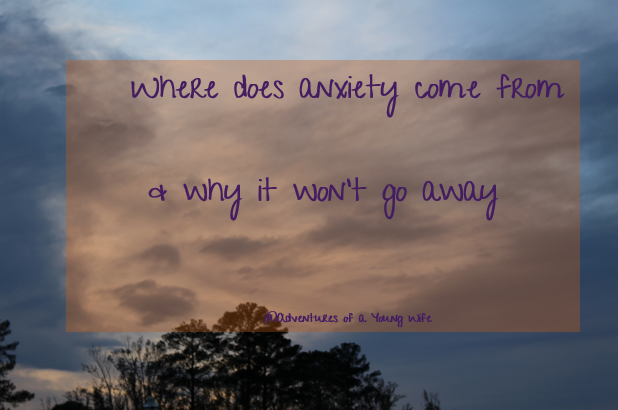 We always think, once that test I over, once my husband gets home from deployment, TDY, the field; my kid grows out of this phase then I won’t be anxious any more. And yet, as soon as that event ends and we think we can relax, we just find something else to be anxious about. Why can’t we just relax? Well I will tell you. The reason we have so much anxiety in our lives is because the society we live in perpetuates it. Just watch any TV commercial it will tell you all about the products you are missing out on and that you just have to have, and you will see that it is breeding grounds for feeling like we are missing out. We are constantly comparing our lives to everyone around us, who we assume always has everything perfectly together. And we suddenly feel very inadequate. Sure, come January first and we are making our new year’s resolution we will vow not to compare ourselves to other, but January 2nd rolls around and we go to a friend’s house and their house is already un-decorated, put away and cleaned. And we go home to our house filled with boxes of unfinished, unorganized Christmas decorations and we fall back into the trap. So what can we do about this vicious cycle? Because we are imperfect people, we will never rid our lives of anxiety fully, but if we recognize the cycle and can identify it in our own lives then we can get one step closer to living peacefully alongside our anxiety. Wait what did you just say you might ask? Living peacefully alongside anxiety? That sounds like an oxymoron. In some ways maybe. But because there is always going to be a new product out, our friends will always be doing something different from us, we are always going to have that anxiety in our lives; and that’s ok. It is how we respond to our anxiety that determines whether or not we live peacefully. So how do we respond to this anxiety, the answer is to know that its normal. Often we think we are in the wrong for feeling anxious, because everyone hides their anxiety from everyone else; trying to pretend it doesn’t exist. By acknowledging it we gain power of it, we are no longer acting out of anxious reactivity we can choose how we respond to the anxiety. Reactivity to anxiety is what keeps us in the falsehood of as soon as the circumstances change our anxiety will lift; keeps us constantly purchasing the next “it” item of clothing, make-up, toy for our child; it’s what keeps us constantly looking for something else to satisfy our void. Reactivity will never make our anxiety go away it will just shift the focus of our anxiety. But recognizing our anxiety, and operating knowing that we have control over our anxiety is the freedom we are searching for. We own our anxiety by recognizing that its present and choosing to act despite it. It is the push to try something new, dare to be different, and own and accept your life for what it is and what God has given to you. Way easier said than done I agree; however, with prayer, patience, and knowing we aren’t always going to get it right we can live peacefully alongside our anxiety instead of imprisoned by its constraints. Today I read a blog post titled, "Suicide is Attention Seeking." At first read of the title I was a bit outraged. In all my clinical training and life experiences I have been taught that suicide is a big deal and a real problem. Nobody is immune to it. But after I passed the blog twice I finally decided to read it, if for nothing more than to learn about those views contrary to mine.
However, as I read I found myself agreeing with the writers opinions. Suicide is a desperate cry for someone to pay attention to them. It is not a lessening of the seriousness of suicide. Since this is Suicide Awareness Month I thought this was an appropriate time to share. Never be afraid to ask, never be afraid that you can do anything. All it takes is compassion, care, and concern for those in our world that we interact with daily. As a family counselor this is my mission: to provide support to those in need, however that support looks like. Right now it is to support soldiers and their families. I am more grateful than I could imagine for the opportunity I have been given to serve those who serve. |
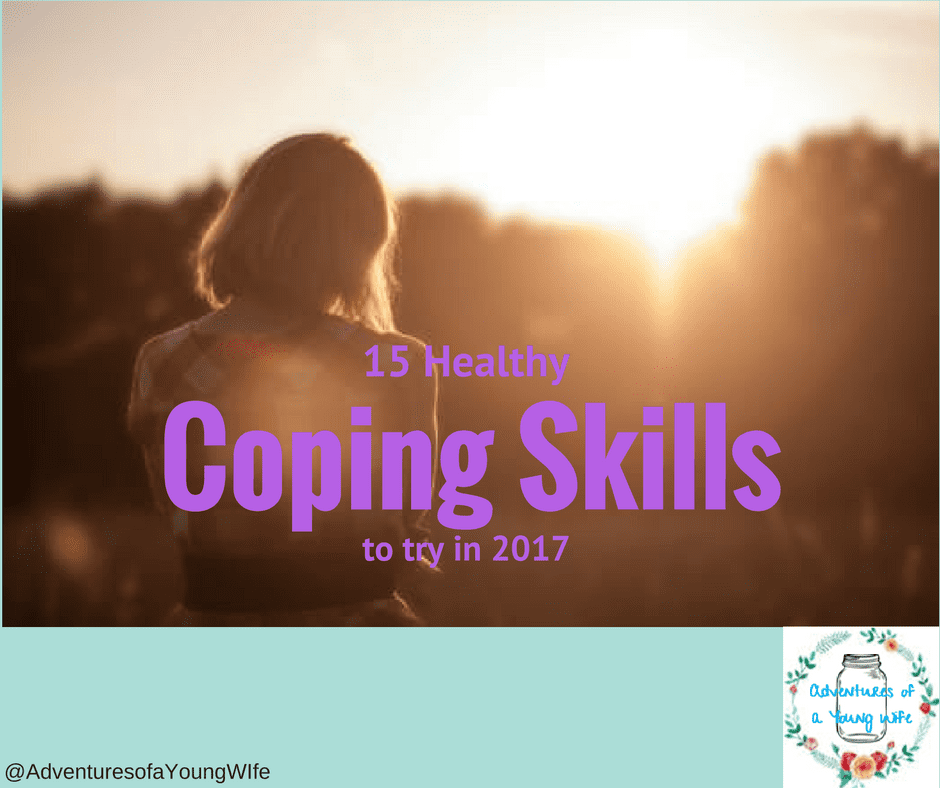


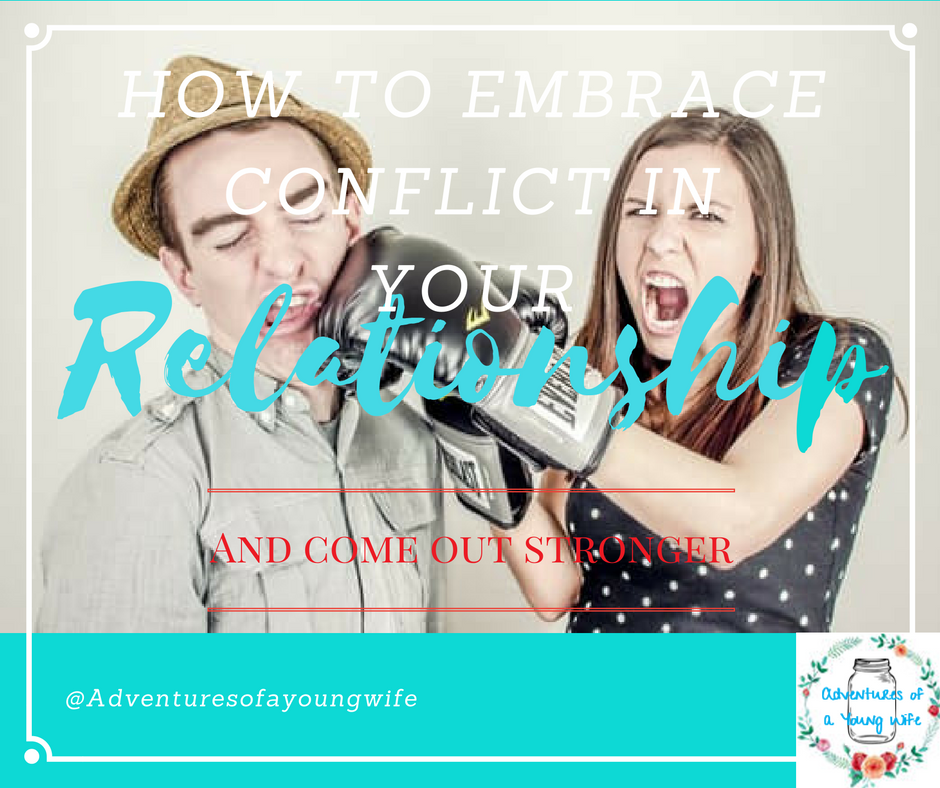
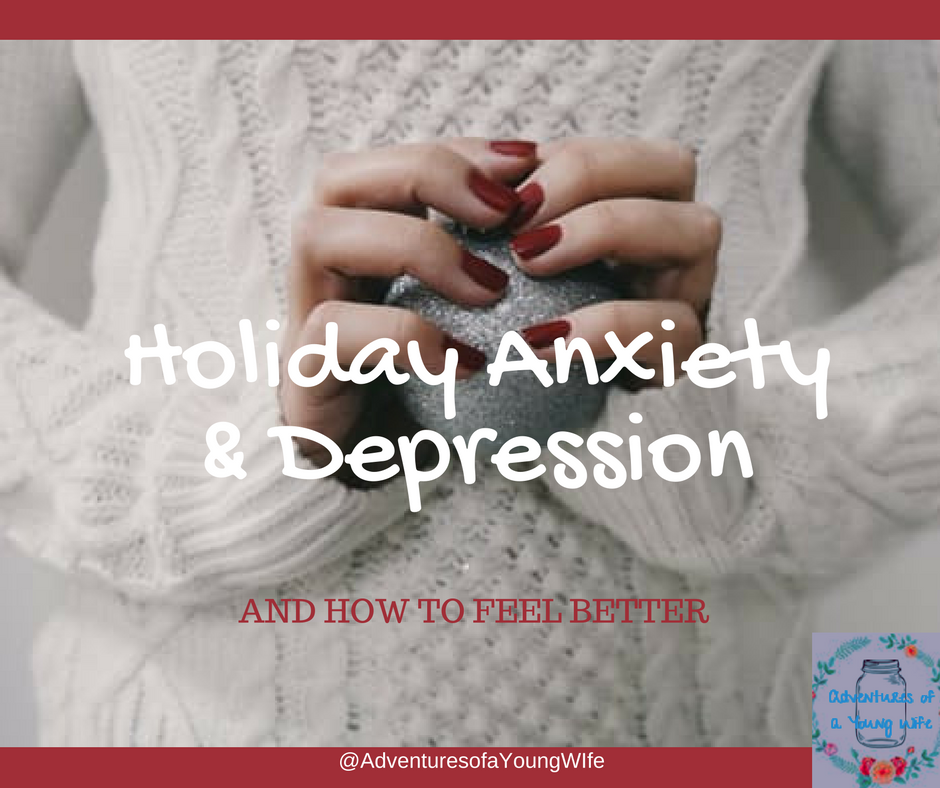
 RSS Feed
RSS Feed
